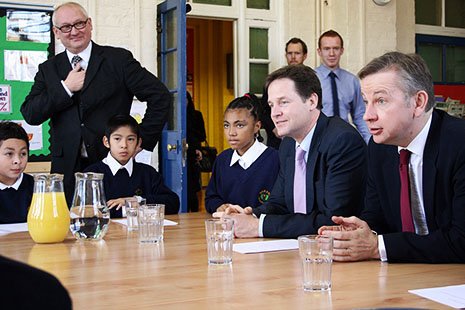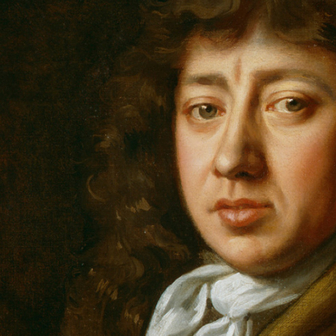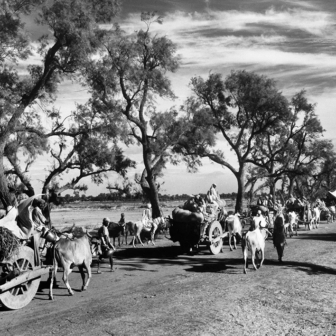WHEN Australia’s federal education minister Christopher Pyne claimed that independent public schools are always better than those run by public authorities, he was only repeating what successive education secretaries in Britain have been saying for years.
His plan to spend a lot of public money enticing public schools to become independent, while light on detail, has been British government policy since 2000, when Tony Blair’s education secretary David Blunkett introduced privately run academies. The momentum was briefly lost during Gordon Brown’s prime ministership because Brown and his education secretary Ed Balls were not wholly convinced that private is always better, though they dared not speak the heresy in public.
But since David Cameron’s Conservative-dominated coalition government took office in 2010, the education secretary has been Michael Gove, for whom it is an article of faith that the best schools are private schools. Gove has invented a new sort of privatised education which he calls free schools.
So does Britain’s experience bear out Pyne’s theory? Sadly not. The policy has not resulted in improved standards, and it has not lowered the incidence of failing schools. Turning children’s education into another consumer commodity has, however, made several people seriously rich, and thereby created a powerful pressure group which will fight to keep every gain that privatised schooling has made.
It has also greatly strengthened the power of organised religions. Principally Anglicans and Catholics, but to a lesser extent Muslims and Orthodox Jews, now control far more publicly financed schools than before, and can decide who teaches in them and who gains admittance to learn in them. Prior to this scheme, there was a careful compromise between church and state, constructed by the 1944 Education Act, which gave organised religions a few schools but ensured that there were generally non-denominational schools available to parents who wanted them. The academies program blew this apart, and in some areas there are now only Christian schools.
Academies, Blunkett told us in 2000, were to be independent schools for which a sponsor – a business, a church, a charity or a very rich individual – was expected to find a fifth of the capital costs, which could be up to £2 million. This requirement disappeared very quickly, as business explained forcibly to Blunkett that it was not there to give money to the state education system, but to take money from it.
The government was to pay running costs, far more generously than for other schools. But the sponsors’ modest share in the investment gave them a level of freedom in how they ran the schools which no state school in Britain had ever had. Democratic elements – teachers, parents and local council representatives on the governing body – were stripped out. National pay scales could be ignored, and if they were taking over an existing school, academies could fire any of the existing staff they didn’t want.
They could also expel pupils more easily than other schools, and could select up to 10 per cent of their intake on the basis of aptitude for the school’s specialism. The pupils they did not want were dumped on neighbouring state schools.
Despite all these inbuilt advantages, academies never proved that they were better than conventional state schools – although the government set about denigrating the efforts of teachers in the schools replaced by academies, in order to suggest they were. Dozens of embittered teachers saw their life’s work belittled to suit the new political agenda.
One of them was Gordon Potter, former deputy head at Coulby Newham School in Middlesbrough, closed in 2003 to make way for a city academy. He became sick of reading about what a rotten school he used to run. Despite having a much more deprived intake than other local schools, they had excellent results. The academy that replaced Potter’s school, sponsored and run by a construction company, expelled ten times as many pupils as the national average and still did not get anywhere near to meeting its public examination targets. By 2005 it was in serious trouble. It was not the only one.
The government appointed a businessman, Cyril Taylor (soon to be Sir Cyril, knighted for services to education) to sell the idea of sponsoring schools to businesses. I once asked him what a businessman added to a school. He had once, he replied, been given a lift to his office early one morning by Lord Harris, the carpet millionaire, who runs a chain of academies. From the back of his Rolls Royce, Lord Harris first phoned round his stores asking for yesterday’s sales figures; then he phoned round his schools, asking for today’s attendance figures. And that, said Sir Cyril, is what a successful businessman can bring to education.
The Christian churches, with falling attendances, grabbed the chance to increase their importance in British education massively. Of the forty-six academies open by October 2006, fourteen – just under a third of the total – were entirely in the control of Christian organisations or evangelical Christians. Three others had Christian organisations as one half of the sponsorship team. All said that the faith was a central part of their academy. These organisations had the power to decide what is taught and how it is taught.
Of these sponsors, the two most disturbing were the evangelical Christians Sir Peter Vardy and Robert Edmiston. Sir Peter is a creationist. He believes that the Bible is telling the literal truth when it says that the universe was created by God in six days; and he believes that this event occurred in 4004 BC.
“Schools should teach the creation theory as literally depicted in Genesis,” said Nigel McQuoid when he was head of Sir Peter’s Kings Academy. “The Bible says clearly that homosexual activity is against God’s design. I would indicate that to young folk.”
The Bexley Academy, run by a businessman, had a mock stock exchange dealing room, to show pupils what really matters, which is of course making loads of money.
After a parliamentary committee examined the academies program in 2005, it told the government: “We fail to understand why the DfES [Britain’s education department] is putting such substantial resources into academies when it has not produced the evidence on which to base the expansion of this program… What evidence there is paints a mixed picture. Despite the paucity of evidence, the government is enthusiastically pushing forward with the program and with new academies. We caution against this approach and urge the DfES to monitor carefully the performance of academies and adjust its policies accordingly.”
NOTHING has changed, except that more time has passed and the program ought by now to be proving its worth. It isn’t, but it has become a matter of dogma.
In 2010, within days of taking office, the new Conservative education secretary gave all schools the right to become academies if they wanted to. Not long after, the Times Educational Supplement looked at all the areas that were likely to have new academies, and found that most of them were affluent middle-class areas. Instead of driving up standards in the most deprived areas, academies were six times less likely to be set up in those communities. By then, the Church of England was by far the biggest academy sponsor.
In the same year, free schools were introduced, to provide another avenue for privatising state schools. Free schools are new schools set up and controlled by parents, teachers, charities or businesses. The first twenty-four free schools opened in autumn 2011.
Scandals persist in the academies, as they are bound to do when businesses are given more or less unlimited access to public money. As I write, it’s just been revealed that Grace Academy, which runs three schools in the Midlands and was set up by the Evangelical Christian Robert Edmiston – now, naturally, Lord Edmiston – has paid more than £1 million to or through companies owned or controlled by Edmiston, members of the board of trustees and trustees’ relatives. All of this public money comes from the state education budget and not one penny directly benefits the children in these schools.
Last summer, Britain’s school standards watchdog, Ofsted, compared the most recent reports for converted academies with the last full Ofsted report for their predecessor schools. Thirty-eight per cent were deemed to be worse than they were before conversion. Only 13 per cent showed a higher grading post-conversion, and 48 per cent had the same grading.
Meanwhile, the free school program has been producing its own rash of problems and scandals. The government has been forced to close a Muslim free school in Derby after Ofsted described it as “dysfunctional, inadequate and in chaos.” And an old academies problem has surfaced with a new edge. Free schools are being founded in well-off areas that already have a surplus of school places – drawing funds away from poor areas with a shortage of school places.
Gove has promised to make state-funded schools more like fee-charging schools, and the way to do that, he believes, is to subject them to the same market forces. But there is a wrenching irony in all this. Back in the sixties and seventies, we now know, the private fee-charging schools controlled by the Catholic order of the Salesians in Britain was partly staffed by child-abusing priests. Today, its five schools are all state-funded. •




